MSI Z97 MPower Max AC Review: Overclocking for $260
by Ian Cutress on May 20, 2014 12:00 AM EST- Posted in
- Motherboards
- MSI
- Z97
System Benchmarks
Rightmark Audio Analyzer 6.2.5
The premise behind Rightmark:AA is to test the input and output of the audio system to determine noise levels, range, harmonic distortion, stereo crosstalk and so forth. Rightmark:AA should indicate how well the sound system is built and isolated from electrical interference (either internally or externally). For this test we connect the Line Out to the Line In using a short six inch 3.5mm to 3.5mm high-quality jack, turn the OS speaker volume to 100%, and run the Rightmark default test suite at 192 kHz, 24-bit. The OS is tuned to 192 kHz/24-bit input and output, and the Line-In volume is adjusted until we have the best RMAA value in the mini-pretest. We look specifically at the Dynamic Range of the audio codec used on board, as well as the Total Harmonic Distortion + Noise.
Dynamic Range of MSI Z97 MPower Max AC
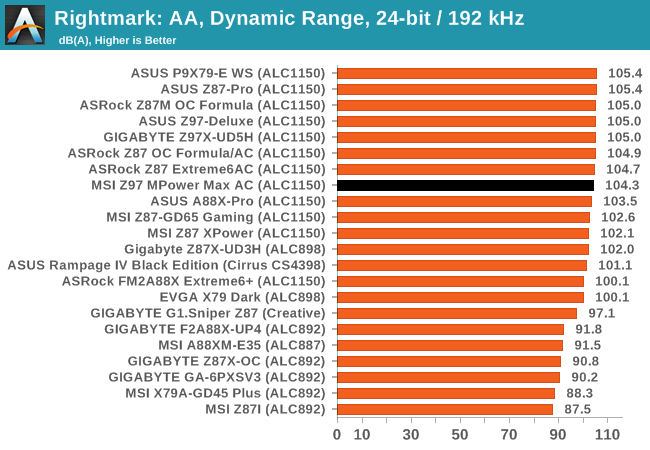
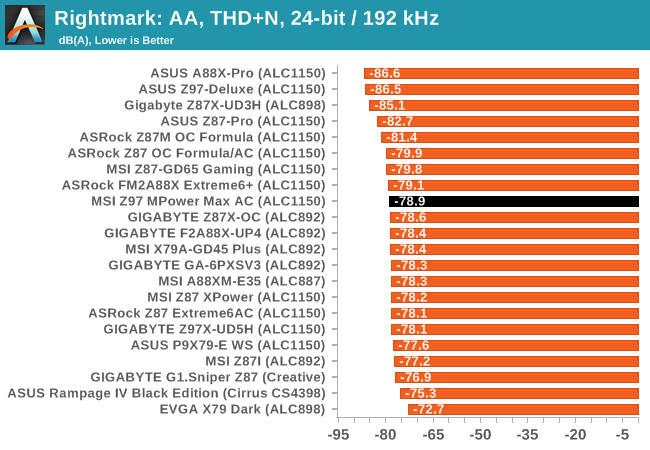
While the MSI solution does well enough in absolute dynamic range, like previous iterations the THD+N seems lower than the rest of the Z97 motherboards.
USB Backup
For this benchmark, we run CrystalDiskMark to determine the ideal sequential read and write speeds for the USB port using our 240 GB OCZ Vertex3 SSD with a SATA 6 Gbps to USB 3.0 converter. Then we transfer a set size of files from the SSD to the USB drive using DiskBench, which monitors the time taken to transfer. The files transferred are a 1.52 GB set of 2867 files across 320 folders – 95% of these files are small typical website files, and the rest (90% of the size) are the videos used in the WinRAR test. In an update to pre-Z87 testing, we also run MaxCPU to load up one of the threads during the test which improves general performance up to 15% by causing all the internal pathways to run at full speed.
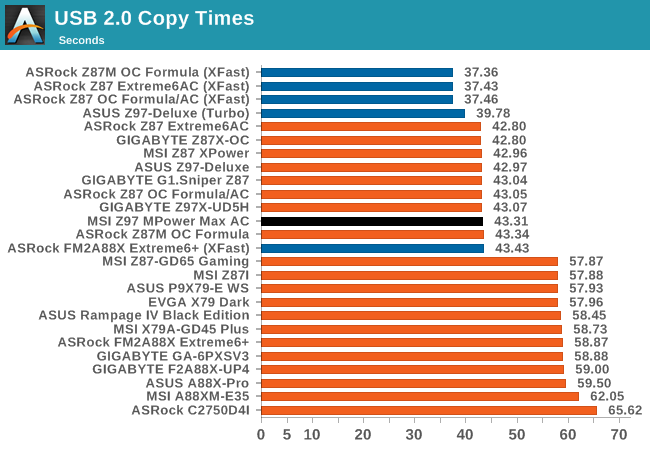
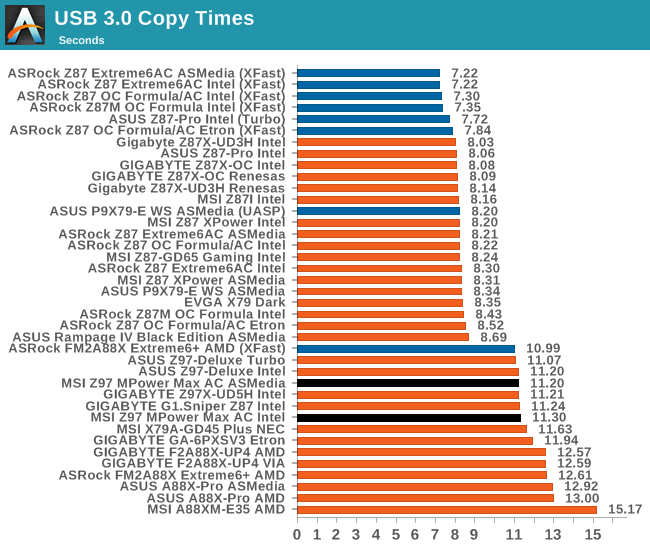
The performance difference between the ASMedia controller and the chipset USB 3.0 ports is rather small, however the better performance lands on the side of the controller oddly enough.
DPC Latency
Deferred Procedure Call latency is a way in which Windows handles interrupt servicing. In order to wait for a processor to acknowledge the request, the system will queue all interrupt requests by priority. Critical interrupts will be handled as soon as possible, whereas lesser priority requests, such as audio, will be further down the line. So if the audio device requires data, it will have to wait until the request is processed before the buffer is filled. If the device drivers of higher priority components in a system are poorly implemented, this can cause delays in request scheduling and process time, resulting in an empty audio buffer – this leads to characteristic audible pauses, pops and clicks. Having a bigger buffer and correctly implemented system drivers obviously helps in this regard. The DPC latency checker measures how much time is processing DPCs from driver invocation – the lower the value will result in better audio transfer at smaller buffer sizes. Results are measured in microseconds and taken as the peak latency while cycling through a series of short HD videos - less than 500 microseconds usually gets the green light, but the lower the better.
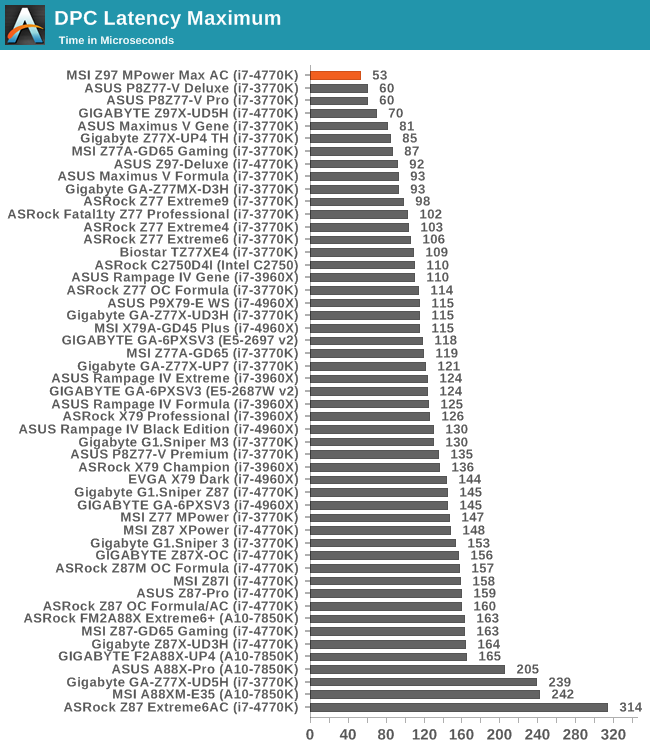
The super low DPC Latency on Z97 continues, with the MSI Z97 MPower Max AC hitting the lowest ever in our reviews. 53 microseconds, as a peak DPC Latency, is awesome, beating the top runners at 60 that have been there for some time. Long may this trend continue…?


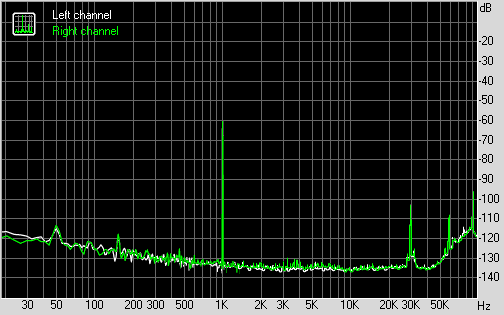








19 Comments
View All Comments
Nintendo Maniac 64 - Tuesday, May 20, 2014 - link
Can I just say that it still feels weird to see AnandTech benching Dolphin? I mean, I know that I was the guy that sent the email about the benchmark, but emulation just seemed like one of those more "hush hush" things you just didn't talk much about...Also, you've been misspelling "boost" as "post" in every single article with the Dolphin benchmark - "provided a significant post to emulator performance". You may want to fix your typo from wherever you're copy & pasting that text from, not just fixing it in the article.
Ian Cutress - Tuesday, May 20, 2014 - link
Hi NM64, yeah that typo is a carry over from my custom review template. I've fixed in the original now. It's good to have an emulation in general, as not all emulation is perhaps licensed games.silenceisgolden - Tuesday, May 20, 2014 - link
Thank goodness MSI is listening to feedback about connectivity. I wouldn't want a thing changed about this motherboard, and if I wasn't waiting for the new -E line I would upgrade to this. It really is refreshing to see a brand not get caught in the SATA Express hype, cater to old PCI, and realize that USB3 is here in full.Galatian - Tuesday, May 20, 2014 - link
I beg to disagree but to each their own. Personally I feel somewhat letdown by Z97. We have M.2 and SATA Express ports but they are already outdated because they don't use 4 x PCIe 2.0 lanes as they could. Instead they opt out for multiple SATA and USB ports. Realistically: How many of those ports does one need? Me as a gamer I have one SSD in my case and a keyboard, mouse and xbox controller receiver connected to USB. That's all.Morawka - Tuesday, May 20, 2014 - link
the problem is not enough lanes in haswell and Z87/Z97. 2X SLI is already running at 8X 8X. Besides, what they are currently using on this board is enough to saturate what the M.2 SSD's are capable of.reininop - Tuesday, May 20, 2014 - link
Well, from the perspective of another gamer, that also uses his system as a all-purpose system as well, I have a keyboard, mouse, printer, xbox wireless receiver, wireless adapter, headphones, charger for my phone, charger for headphones, extension to monitor usb ports, and maybe one other thing. I'm sure there are others with even more needs.Morawka - Tuesday, May 20, 2014 - link
Metro Last Light Inspired Box?theduckofdeath - Wednesday, May 21, 2014 - link
I was thinking the same :3r3loaded - Tuesday, May 20, 2014 - link
Is Asus coming out with a Maximus VII Formula? It'd be great to compare that with this board as MSI have a very strong competitor here. Either way, it bodes well for the Haswell-E equivalent of this board.Galatian - Tuesday, May 20, 2014 - link
ASUS hasn't introduce their entire line-up for Z97 yet. They are probably waiting for the Devil Canyon chips.